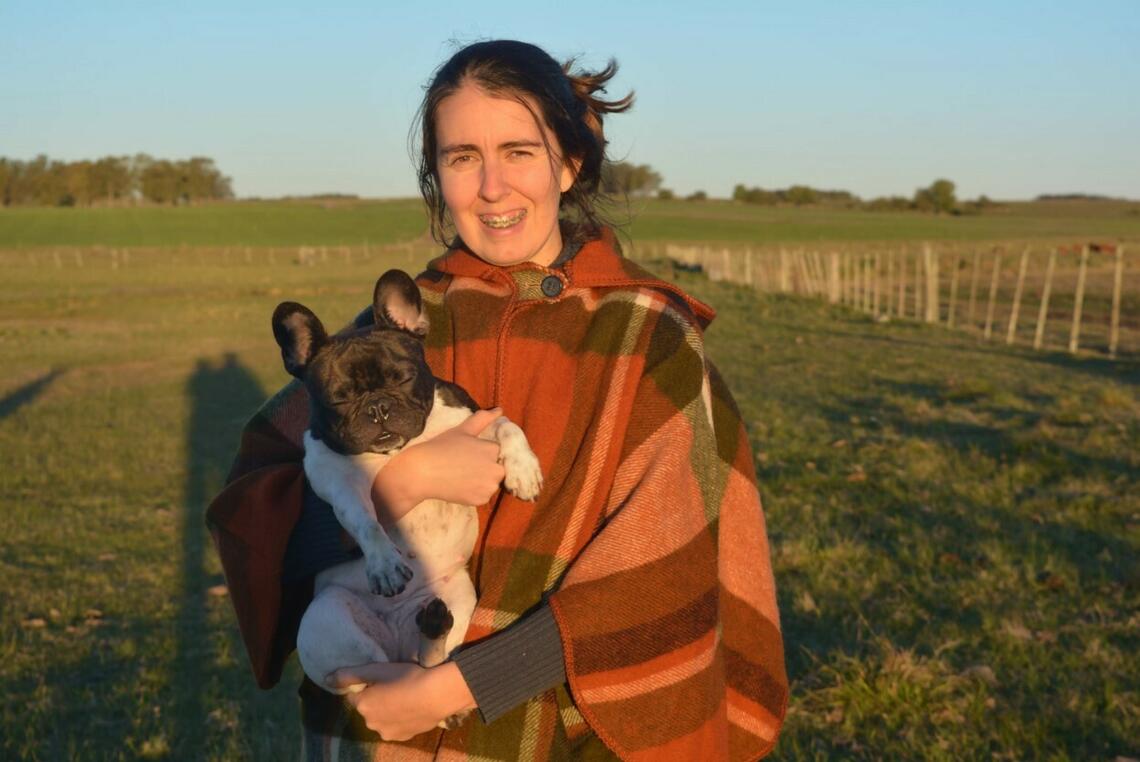Oct. 31, 2023
3 sisters, 3 veterinary research themes, 1 problem to solve

Picture this: three sisters step off a plane from Uruguay. The security guard asks them what brings them to Canada. In unison, they reply, “We’re here to study cattle and save the world.”
It sounds like there should be a punchline coming, but there isn’t. This is basically the reality for Dr. Veronica Sanguinetti, DVM, and her sisters, Lucia and Dr. Maggie Sanguinetti, DVM. They were raised on a cow/calf farm in Uruguay, but have converged at the University of Calgary's Faculty of Veterinary Medicine (UCVM) to research the intricate link between agriculture, animal health and the environment. A true one-health approach.

Maggie Sanguinetti.
Courtesy Veronica Sanguinetti
“We ended up at UCalgary individually for our graduate programs, but our unique bond and shared passions brought us together," the sisters write in a joint comment. "Technically, we are not triplets, though we pretty much act like it. People usually point out our facial expression similarities and physical appearance, though the three of us secretly know it's more than just that.
"The three of us are passionate about animals, nature and science, though we discovered after being four years apart that we feel complete fullness when we reunite. It's just as if we have adopted the same herd behaviour our sheep flocks have."
Veronica, who has a doctorate in veterinary sciences from a university in Paraguay, is focusing her thesis-based Master of Science at UCalgary on comparing antibiotic-resistant E. coli from antibiotic-free cattle versus conventionally raised beef cattle.
“Antibiotic-free beef cattle is a term used to encompass several certifications such as organic, natural beef, RWA (raised without the use of antibiotics), grass-fed," says Veronica. "They all have clear limitations in the use of antibiotics. There is growing awareness among consumers, particularly in North America, regarding antimicrobial use in meat production."
Aside from consumer interests, Veronica adds why we need to study the overuse of antibiotics. “Antimicrobial resistance represents a pressing global health concern," she says. "The potential transmission of resistant genes to other pathogenic bacteria is a real threat. There is a growing body of evidence linking antibiotic resistance in humans to the widespread use of non-therapeutic antibiotics in animals.” Veronica is under the supervision of Dr. Sylvia Checkley, DVM, PhD.
Lucia, in her inaugural year of her MSc, focusing on environmental studies, is exploring how rotational grazing from cow/calf pairs mitigate climate change and impacts on biodiversity.
“Exploring the tangible impacts of climate change and the contentious issue of methane emissions from cattle farming is a trendy and pressing topic," Lucia says. "This discussion highlights the need for practical mitigation strategies that farmers can adopt to reduce greenhouse gas emissions. These strategies must strike a balance between food production, livelihoods and emission reduction, while also aligning with broader sustainability goals.” She is under the supervision of Dr. Guillaume Lhermie, DVM, PhD.
Maggie, whose own DVM also comes from South America, is completing a PhD here and looking at disease control in beef herds.
“This topic is a cornerstone to the efficient production of calves and the sustainability of the beef industry in Canada,” she says. Maggie is developing a decision tool to be used during farm visits to facilitate the use of suitable strategies in operations. “This is an essential area for Western Canada given that most beef calves come from these provinces.” Her PhD work is supervised by Dr. Claire Windeyer, DVM, DVSc.
The UCVM research projects are giving the sisters valuable experience in the fields of sustainable agriculture and veterinary epidemiology. Seemingly disparate topics, but all delicately intertwined.
Lucia lays the groundwork by exploring the most environmentally and economically sustainable way to raise cattle. Maggie ensures that these cattle are healthy and productive. Veronica rounds out with the small, but mighty bacteria, ensuring that we aren’t inadvertently strengthening them with unnecessary antibiotics.
Overall, all of their research projects target the same global topic of feeding the world and promoting an essential source of protein for human populations.

W.A. Ranches, gifted to UCalgary in 2018 by Jack Anderson and his daughter, Wynne Chisholm, where much of UCVM's cattle research is conducted.
UCalgary Archive
And where does Uruguay fit in all of this? Uruguay, in some respects, is quite similar to southern Alberta. Cattle production is an important source of income, and there is a lot of tradition with respect to livestock. Rodeos in Uruguay look similar to our beloved Stampede. The capital city, Montevideo, is even similar in size and amenities to Calgary.
But there are also differences, says Lucia. “Uruguay ... has a temperate climate with mild winters and abundant rainfall," she says. "This climate allows for year-round grazing of cattle on lush pastures. Uruguay stands out in the agricultural world due to its dual focus on both beef and sheep farming ... This diversified approach allows for sustainable land management and positions Uruguay as a versatile contributor to global demand for premium animal products.”
The sisters share a large-scale vision of their research bringing benefits to humans, the environment and animals.
“We aspire to contribute to sustainable beef cattle practices that balance ecological and economic interests, reflecting our shared commitment to making a positive impact,” says Lucia.






